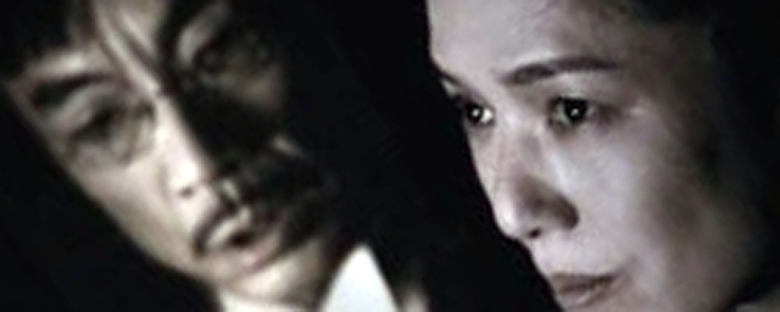Reviews
Solntse
Aleksandr Sokurov
Russia / Italy / France / Switzerland, 2005
Credits
Review by Leo Goldsmith
Posted on 26 October 2005
Source The Works 35mm print
Related articles
Features: The 43rd New York Film Festival
The Sun is an extremely quiet film — often quite difficult to even hear — but notably present on the film’s soundtrack is the persistent sounds of recording. Often the scratching of pen on paper — as Emperor Hirohito composes a haiku in his diary, or as a secretary records meetings between the emperor and his advisors — are the loudest sounds to be heard, and the whir and crackle of a detuned radio floats occasionally in the background. This is particularly notable as so little is known about Hirohito, and his diaries and the records of his meetings remain hidden from the public.
The third of Aleksandr Sokurov’s films of conjectural biography, The Sun is an idiosyncratic portrait of Emperor Hirohito, narrowly focused on the days leading up to and following Japan’s surrender to Allied forces at the end of World War II. Like his previous films, Moloch and Taurus (which respectively portrayed Hitler and Lenin), The Sun depicts its central figure as a rarefied and slightly buffoonish person who is physically and mentally cut off from the world. Like Hitler in his Alpine Eagle’s Nest, and Lenin in his convalescence, the emperor exists in complete isolation in his palace, his personal and political life inextricably bound by a rigorously organized schedule of work and leisure.
Contrary to many contemporary histories, Sokurov’s film depicts Hirohito as a complete naïf with little or no concept of the military expansion and operations of his country’s regime. Late in the film, Hirohito tells General MacArthur that, following the bombing of Hiroshima and Nagasaki, he feared his country was being invaded by wild beasts. Such a fear finds no sympathy in MacArthur, who instantly invokes Pearl Harbor, much to the emperor’s bemusement.
What the film portrays is a Hirohito who is wholly imprisoned in his deification and cloistered by tradition and politics. Decades of obsequiousness and a boundless indulgence of his eccentricity have given Hirohito the aspect of a sheltered manchild, puttering around the dim confines of his palace, occasionally poking into his laboratory to immerse himself in the study of marine biology. As inhabited by Issey Ogata, in a very strange performance, Hirohito mutters to himself, makes peculiar fish-mouth faces, and inquisitively pores over photographs of Marlene Dietrich, Hitler, and Charlie Chaplin. Oddest of all, with his furtive movements and childlike charm, Ogata even exploits the emperor’s resemblance to Chaplin’s Tramp, hammily sniffing flowers for U.S. Army photographers and leaving General MacArthur with the feeling that, “he reminds me of someone, but I can’t think whom.”
Historically factual or no, Sokurov’s film serves as an interesting exercise in the shattering of myths. Just as the emperor eventually renounces his status as a god — to the shame of his country, and to the seeming relief of him and his wife — The Sun divests the image of Hirohito of any remaining vestiges of mystery or imperial prestige. The only mystery that remains is a sense of the confusion that awaits Japan in the wake of its surrender, a confusion reinforced by the characteristically muddy grayness of Sokurov’s images.
In presenting this eccentric, historically dubious biography, Sokurov seems to have a certain faith in his audience, trusting their perceptiveness about the ways in which history is portrayed onscreen. To make a film about Hirohito (as a film about Hitler or Lenin) is to tread a dangerous path, one likely to incite controversy about the relative truth of its portrayal and to leave bewildered those who want a neat and comprehensive historical primer. Throughout the film, Sokurov playfully adopts historiographic ideas, only to drop them quickly. Familiar analogies and explanations are tried on and discarded at random — like the “emperor : state :: brain : body” syllogism; or Hirohito’s own extrapolation of the causes of war from studying the hermit crab — possibilities that each seem more insufficient than the last. In many ways, The Sun accomplishes the greatest feat that any historical film can: to leave the viewer more confused and uncertain about his or her knowledge than he or she was before the film began.
We don’t do comments anymore, but you may contact us here or find us on Twitter or Facebook.



